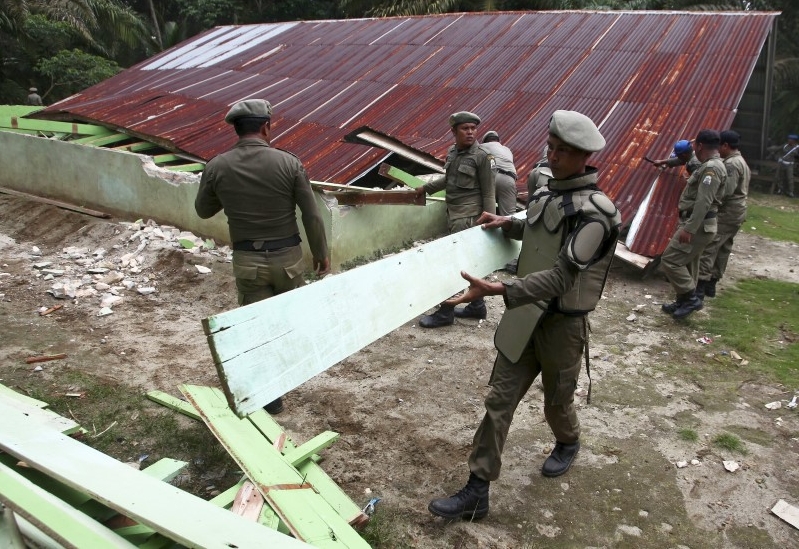
When a mob of Muslims swooped on a little church deep in rural Aceh in Indonesia this month, the local police were nowhere to be seen, although they had received warnings of a possible attack.
When they did arrive, the police were mostly unarmed and outnumbered by hundreds of activists from the hardline Islamic Defenders Front (FPI) group and others who burned the rickety church down.
The FPI made no apology for the incident, saying authorities had ignored repeated complaints about churches and makeshift altars that have popped up without permits in Aceh Singkil, a district in the most conservative province of this Muslim-majority Southeast Asian nation.
In the wake of the attack, authorities gave in to the FPI's demands, and used sledgehammers and axes to demolish 10 other churches in the area that lacked proper permits. The national police chief later said intelligence reports that such an attack was being planned had been received.
The raid, and the aftermath, reflect an increasingly militant attitude towards other faiths in Aceh, where Sharia law now requires non-Muslims to abide by rules forbidding extra-martial sex,homosexual relationships and public displays of affection.
Analysts say the FPI and similar hardline groups, emboldened by government inaction, are using legal pretexts to undermine Christians, Hindus, and smaller Islamic sects.
"These churches have been mushrooming here for years and the Christians are violating laws because they don't have permits," said Muslim Al Thahiry, chief of FPI's Aceh chapter.
"If the police or the government don't do anything about it, then don't blame the Muslims for getting emotional and responding. Islam shouldn't have to be a guest in its own home."
Residents of Aceh Singkil say the number of non-Muslims there has swelled in recent years because of migrants from neighboring North Sumatra, where Christians make up a third of the population, looking for work in palm oil plantations.
Census data shows the Christian community in Aceh Singkil has nearly doubled from about 6,500 at the turn of the century, when they made up six percent of the population. Today, over 11 percent is Christian, although the overall population of the district has remained static at about 100,000.
Religious Affairs Minister Lukman Hakim Saifuddin acknowledged in an interview with Reuters that the future of Indonesia's minorities could be "fragile" and said the Aceh attack underlined a need for better law enforcement.
"These conflicts should be resolved with dialogue ... and without causing losses to any side, by which we mean everybody's rights should be upheld," he said.
PETROL BOMBS, BAMBOO STICKS
But all dialogue was "forgotten", said one Christian woman who watched as dozens of people were driven from the ill-fated church with petrol bombs and sharpened bamboo sticks.
At least one of the attackers was found dead with a gunshot wound, but it was not clear who killed him. Thousands of Christians in the area fled, and about 1,000 military and police troops later went in to secure the area.
Local residents say that, for generations, Muslims and Christians have lived peacefully in Aceh Singkil and that interfaith marriages and conversions are not unusual.
"I'm not disturbed by the churches. Their religion is their business and we respect that," said 34-year-old Muslim Nurmalashe as she bought lemons from a Christian neighbor to whom she offered refuge during the attack.
But radical Muslims complain that 27 churches and altars have been erected "illegally" in the area over the years. Local government documents seen by Reuters list 11 Christian structures that were built since 2012, all but perhaps one of which have now been torn down.
The FPI has protested, at times violently, around the country since its creation in 1999: against mosques belonging to the Ahmadiyah sect of Islam, religious events marked by the minority Shia Muslim community, and even against the capital Jakarta's Christian governor.
With a membership of 7 million, FPI is small compared with Indonesia's biggest Islamic group, the moderate Nahdlatul Ulama, which has about six times as many members.
But Ian Wilson of Murdoch University, who tracks the FPI, says the government's failure to rein radical Islam in leaves religious minorities vulnerable and undermines Indonesia's transition to democracy after decades of authoritarian rule.
"But nobody is willing to stand up to it because of the political risk of being branded anti-Islam," he said.






